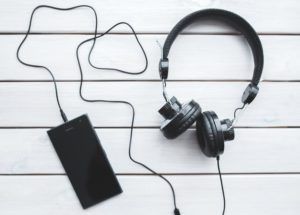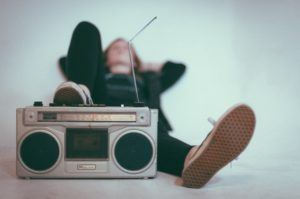Have you ever thought of music as a drug? Consider a time you lingered in your car a bit longer than you needed to just to finish listening to a song. Perhaps it is a song from many years ago that brings back fond memories of someone or of past times. Maybe you like the lyrics because you can relate to them in some way. Or maybe you just find the message creative or amusing.
It might not even have anything to do with the lyrics. In fact, there might not be any lyrics to the song. Or the lyrics may be in a language you don’t understand. Perhaps you just love the rhythm of the song and how it makes you feel. Being that music can be so powerful as to generate a trance-like state, you would be justified to think of music as a drug.

Music’s Effect on the Brain
While the thought of music as a drug might seem far-fetched at first, there is actually scientific evidence to support the view of music as a drug. It has been proven that music causes the release of the same chemicals that our brain releases when in activities associated with pleasure and addiction, such as sex, drugs, exercise, and acts of kindness.1,2,3 If you are not convinced, check out the study conducted at McGill University that concluded that drugs that block the effects of narcotics can also block the pleasure previously caused by music.4

Use of Music as a Drug for Recreation
Music has the power to change affect your mood. Most of you have probably been in situations where you just can’t resist bobbing your head, tapping your feet or fingers, or simply breaking out into dance, upon hearing a particular tune. Alternatively, you may have had situations where you found yourself crying while listening to a particular song. Or perhaps you have sung along with a song whose words perfectly reflected the feeling of rage you were feeling.
You might be interested in: Student of and For Life – This I Choose to Be
It is impressive the many different reactions we can experience while listening to music. After listening to music, you may even be left feeling as though you’ve experienced a cathartic event. Such experiences are not unlike the experiences some people seek when experimenting with recreational drugs. However, using music as a drug to allow you to immerse yourself in mystical experiences is no doubt a safer choice than putting non-medically prescribed chemicals into your body.
There is music to help you experience just about any emotion you’d like to experience. You might prefer music that reflects your own experiences and feelings. After all, knowing that someone was able to translate your internal feelings into music may help you feel better understood. Other times, you might use music as a vehicle explore perspectives, moods, and rhythms that you are not familiar with. It is no doubt a powerful and versatile outlet for expression and exploration.

Music as a Drug for Therapeutic Purposes
The view of music as a drug can be further supported by the fact that it can be used to supplement the treatment of medical conditions, such as dementia, depression, and insomnia.5,6 An example of an initiative that uses music for therapeutic purposes is called the Alzheimer’s Music Project. This project helps patients with Alzheimer’s by creating personalized music playlists for them.7
You might be interested in: FDA Drug Development Process – How It Works
The music playlists help these patients increase their level of engagement, decrease their agitation, and increase positive emotions in ways that traditional medicine can not. Surprisingly, these patients can often recall lyrics to songs even though they have difficulty remembering almost everything else.

Music as a Drug to Enhance Performance
With the ability to act as a stimulant or sedative, you may even use music for more than recreation and illness. You can use music as a drug to enhance your performance in accomplishing a particular task.8
One example of when you might use it in such as fashion is when you need to concentrate and therefore need to block out distracting background noises. Perhaps you have difficulty studying because you live a crowded apartment where you cannot escape the noise of others talking. In this case, special types of music called white noise and brown noise might help you concentrate by helping block background noises.
A second scenario in which you might use music as a drug to enhance your performance is if you are planning to work out or to tackle a big task. In this case, you may want to listen to music that will motivate you, or simply make the activity more enjoyable. The sports industry has a history of recognizing the association of music a performance enhancement drug. In fact, among the reasons that in 2007 the USA Track and Field temporarily banned its athletes from listening to music was that it believed athletes who listened to music might experience a performance advantage.9
A third scenario in which you might use music as a drug to enhance your performance is if you are stressed out. In this case, you can rely on music to help you relax. You can even use it to help you fall asleep, or to meditate. Classical and new age music might be appropriate music choices to assist you achieve these goals.

On Dose and Side Effects
While it is undoubtedly safer to choose music as your drug of choice rather than to intake non-medically prescribed chemicals, there are a number of reasons why you would be wise to use even music in moderation. Listening to music all the time might distract you from your own thoughts. It might be dangerous, for example, to listen to distracting types of music while doing dangerous tasks that require concentration.
You might be interested in: Positive Ways to Cope with Anxiety
Also, if you use music as an escape mechanism, this may result in you not taking actions necessary to address the demands of life. Sure, it might make you momentarily feel better to listen to music rather than confront uncomfortable situations. However, the fact is that you will need to learn to confront life’s stressors in order to lead a healthy life.
There are a few more reason why you might want to moderate your consumption of music. If you frequently listen to music in a high volume, this may cause your hearing to become impaired. Furthermore, some studies have shown that music with negative messages are correlated with negative behavior, particularly in the teenage years.10,11 Due to the possibility that music may affect thoughts and behavior, you should be mindful of the types of music you to which you listen.

Conclusion
The fact that music can induce within you heightened levels of emotion and performance can lead to the view music as a drug. Music is a widespread, affordable, and socially acceptable. It can also produce both stimulating or sedative effects. You can use music as a drug for recreational purposes, for treatment purposes, or to give you an edge on a particular task. Whichever the case, the decision to use music as a drug versus non-medically prescribed chemicals that can cause your harm is likely a smart one. No doubt, incorporating music into your daily life can help you endure situations and appreciate life and its many rhythms. So turn up the music and allow yourself to experience its wonders of this powerful and versatile drug!

